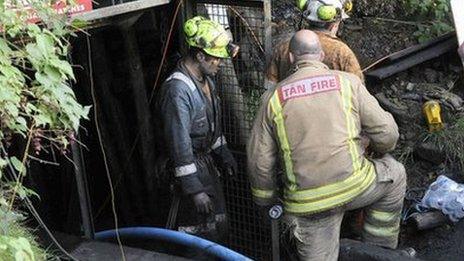Gleision: The mining disaster that was quietly forgotten
- Published
Nigel Evans (left) and Jake Wyatt spoke about their "survivors' guilt" in 2011.
The flashback hits Jake Wyatt as he watches Peppa Pig with his granddaughter and a waterfall appears on screen.
Suddenly he's underground in the dark, there's a noise "like a jet engine" and a torrent of water rushes towards him.
"There's nothing you can do to stop it. You don't get a warning. It's instant, it's there," he says.
Jake, 68, is one of three survivors of the Gleision Mine Disaster, which claimed the lives of four of his friends 10 years ago.
Charles Breslin, 62, David Powell, 50, Phillip Hill, 44, and Garry Jenkins, 39, drowned after water rushed into the colliery, near Cilybebyll, Neath Port Talbot, following a controlled explosion on 15 September 2011.
A desperate two-day rescue effort to save the four trapped men attracted rolling news coverage around the world.
But ultimately, it proved fruitless.
It emerged the miners had died almost instantly, and the operation turned from one of rescue to recovery.
A decade on, Jake's memory of the day remains crystal clear.
A former steelworker from Ebbw Vale, Jake had been working in the Gleision colliery for just over a year as a "fitter", operating and fixing mechanical equipment underground like the conveyor belt that carried the coal.
Sitting in the empty bar of Ystalyfera rugby club, near Pontardawe, Jake holds his hand next to his seat to show the height of the tunnels he worked in. Some were as low as 76cm (2ft 6in).
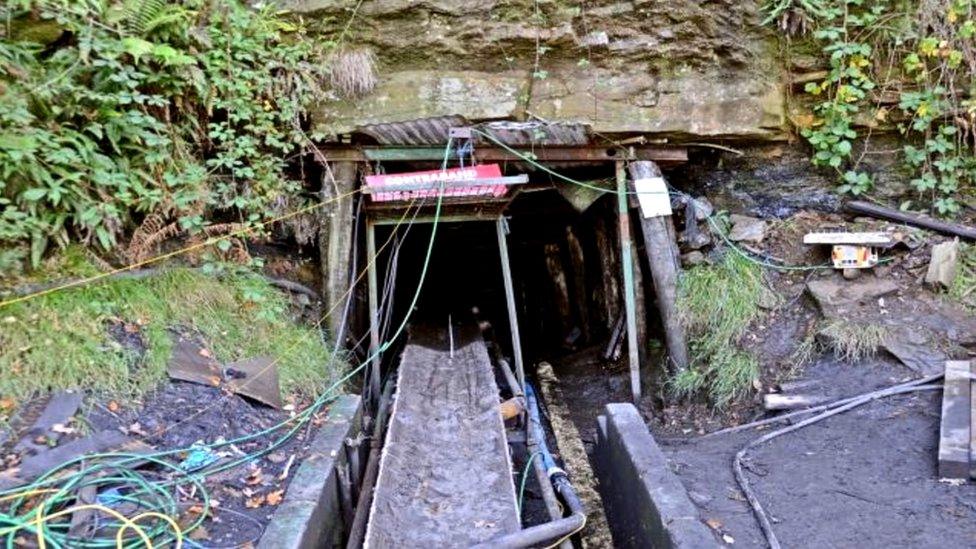
The shaft of the Gleision colliery mine in the Swansea Valley
'Crawling and sinking in mud'
"My first impression was, 'I'm not going to stick it down here'," he says.
"I'd worked in a mine in Bath, but that was the size of this room. I never worked anywhere where I was crawling on my hands, sinking in mud and my back was rubbing the roof."
The tiny drift mine, on a hillside near Pontardawe in the Swansea valley, was similar to others in the area at the time.
One of the other miners working with Jake, Garry Jenkins, grew up near the mine and had worked in other small collieries around the area.
Unlike most of the larger pits that still remained in south Wales at the time, these tiny drift mines had shafts dug sideways on hillsides into the coal seams, rather than vertically down through rock.
These small mines had always been privately owned and usually worked on and off, depending on coal prices, employing a handful of men.
Garry's son Alex Jenkins was 13 in September 2011. His dad had previously worked as a miner but hadn't told Alex he was back underground.
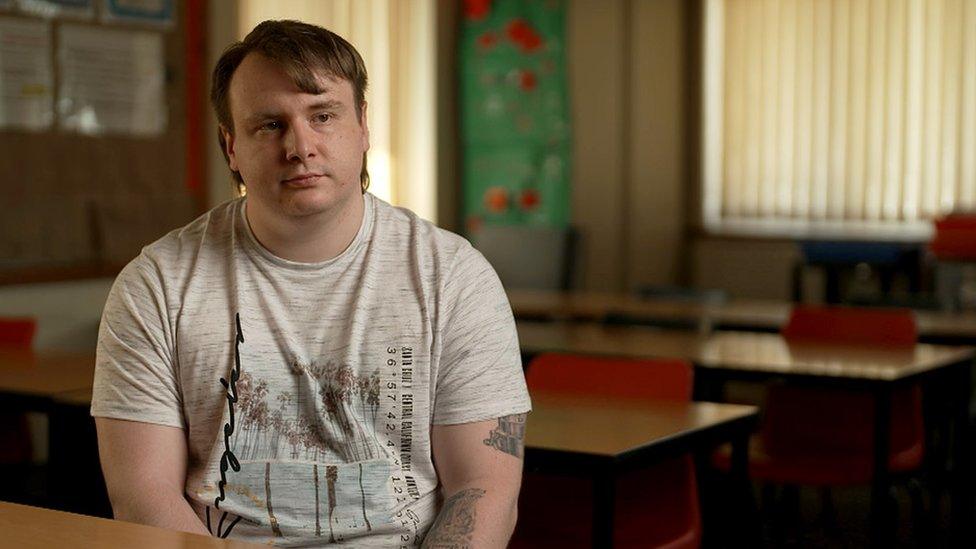
Alex Jenkins was 13 and in school on the day of the accident involving his father, Garry
"When I was very young my parents were divorced and I grew up visiting my father at weekends," says Alex, who is now a student living in Bristol.
"When people hear that your father was a miner, they say, 'was that 100 years ago?'. But no, it was quite recent, actually."
On the morning of 15 September 2011, Alex was in a Welsh class at school in the small town of Ystalyfera. Out of the window, he could see the hillside the mine was under.
Controlled explosion
Inside the mine, Garry and Jake were working within metres of each other. Four of their colleagues were working around the corner, preparing to blast through to some old, disused workings.
The mine's manager Malcolm Fyfield later told a court he had decided to connect through to the old workings in order to improve air circulation and make the mine more productive.
He said he had checked the disused area for water in the areas before they blasted and had found none.
Just past 09:00, he was with the miners at the coal face as they set off the controlled explosion.
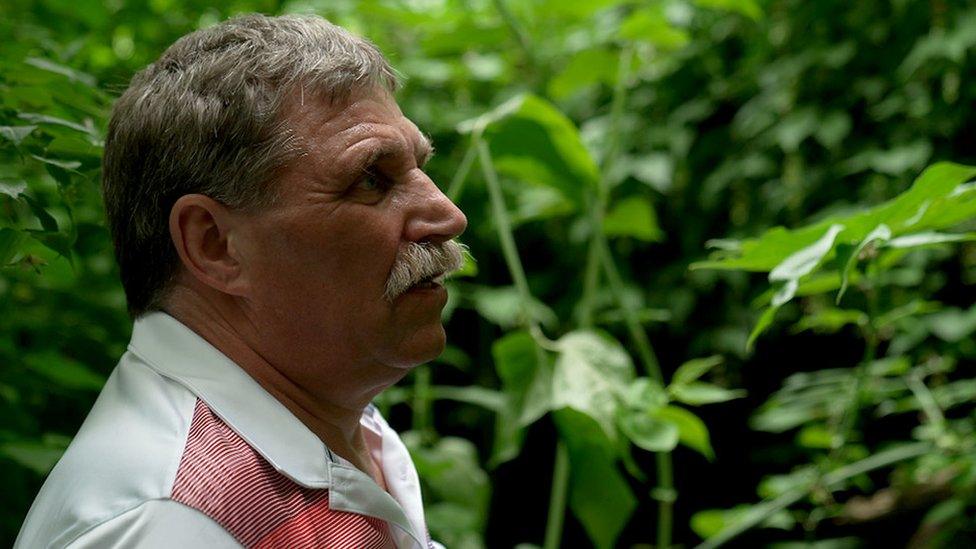
Jake has revisited the site of the mine as the 10th anniversary approached
'No light, nothing at all'
Jake recalls the moment vividly.
"We heard the blast," he says. "Then within seconds you could hear, I described it as a jet engine. We knew something had gone drastically wrong.
"So, I jumped on the belt and we both said the same thing - 'run'.
"I remember crawling down and within about 10 yards (nine metres) I fell off. I heard Garry behind me: 'run!'
"So, I went on back on the belt, going like the clappers of hell. I'd say about halfway down there was a walkway, so I jumped off the belt, turned around and there was no sign whatsoever of Garry. There was no light, there was nothing at all."
With the roaring of the water getting closer, Jake realised he had no time to go back. He just managed to make it back up the main drift before collapsing exhausted on to the ground.
The water had stopped just behind him, flooding the tunnel right up to the roof.
"It was like black ink," he says.
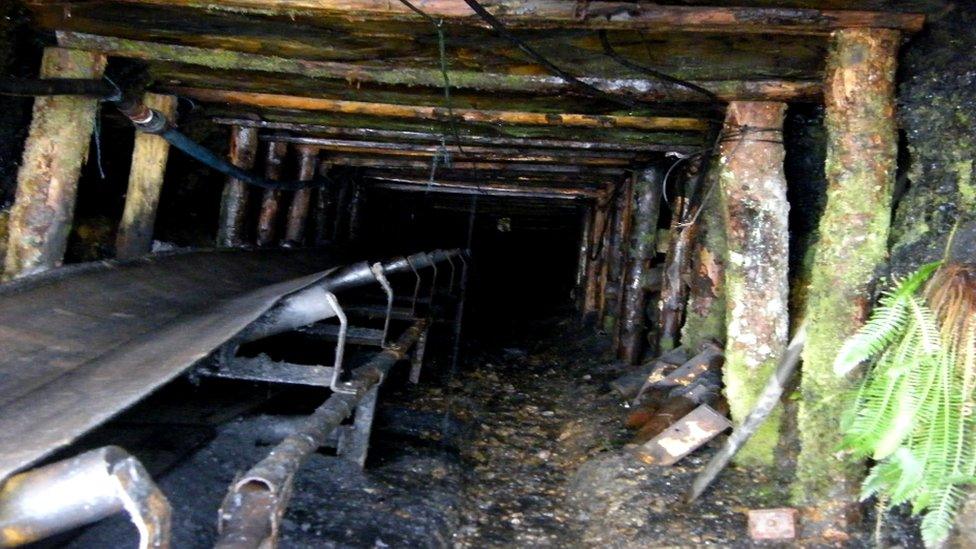
Jake Wyatt describes the water in the shaft as being "like black ink" after it rushed in
Alex, now aged 23, was in class when he had a text from his mum, asking if his dad was working in a mine.
"It was after I had that text and the helicopter started flying across the school building towards the mountain right next to us, something surreal I started thinking was, 'OK there's mines on that hill, there's a text about the mine come through'.
"You start adding two plus two together and not the best answers come back."
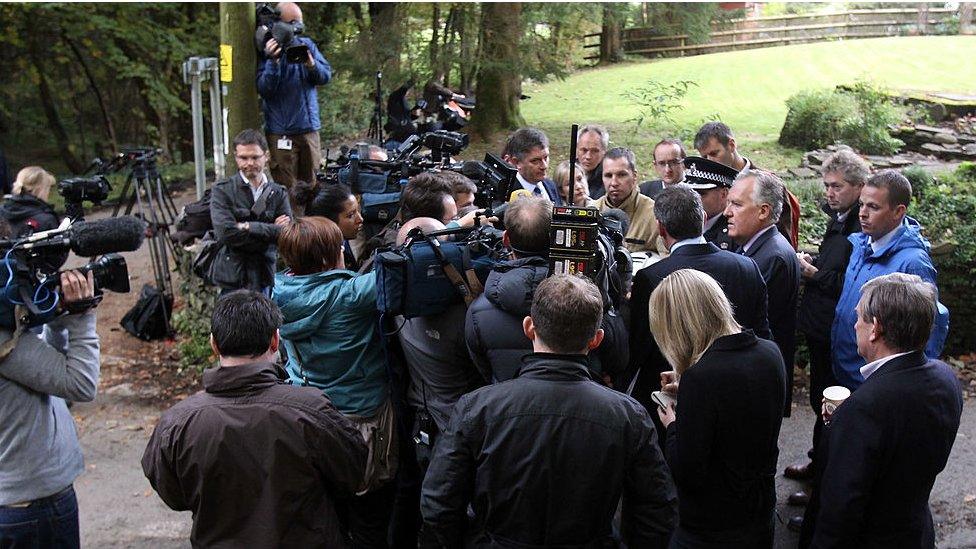
There was rolling news coverage during what would prove to be a fruitless rescue mission
Over the next two days, Mines Rescue Service workers from across the UK worked tirelessly to find and rescue the men, but in vain.
Garry Jenkins was the first of the men to be found. A court later heard he had died seconds after the water reached him.
'Nobody wanted to bother with it'
In 2014, another survivor - the mine's manager, Malcolm Fyfield - and the mine owners MNS Mining were found not guilty of manslaughter charges after a three-month trial at Swansea Crown Court.
In the same year, the acting coroner for Swansea decided not to pursue inquests for the four men.
The Gleision Mine Tragedy was quietly forgotten.
"It was like if nobody wanted to be bothered with it, like it was too much work," says Jake.
But the tragedy will always remain with Jake.
"I can't explain to Garry's son how I'm sat by here, and I'm 20 years older than his father. We were working together. And he's not here. I can't explain to him," he says.
"I think it opened a lot of people's eyes to the conditions of a small mine."
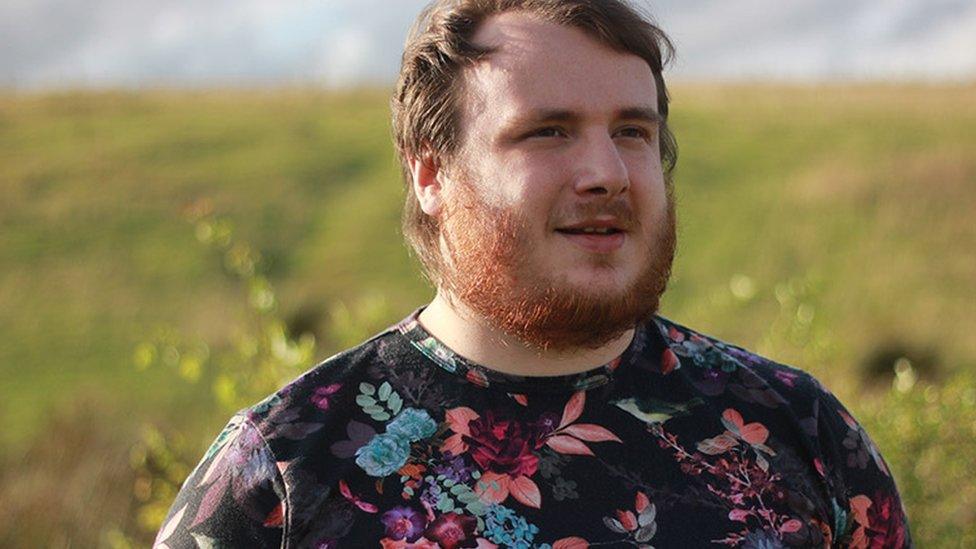
Alex says he will be marking the 10th anniversary of his father Garry's death on 15 September
Alex says he will be marking the 10th anniversary of his dad Garry's death on 15 September by going for quiet drinks with his friends, just as his dad would have done.
He has never met Jake but understands the survivor's guilt he carries and plans to meet him - away from journalists and news crews - to reassure him it's not his fault.
Both men, along with other relatives of the four men who died at Gleision, are calling for an inquest, to finally answer the questions they feel have never gone away.
"I've got to say I almost broke down about half hour ago with the questioning because it's bringing back memories which I locked away," says Jake.
"But I'm glad we're doing this. I really, really am glad to be doing it.
"For me, basically, I want, hopefully to get some results for the families and the fact this has been swept under the carpet for the last 10 years."
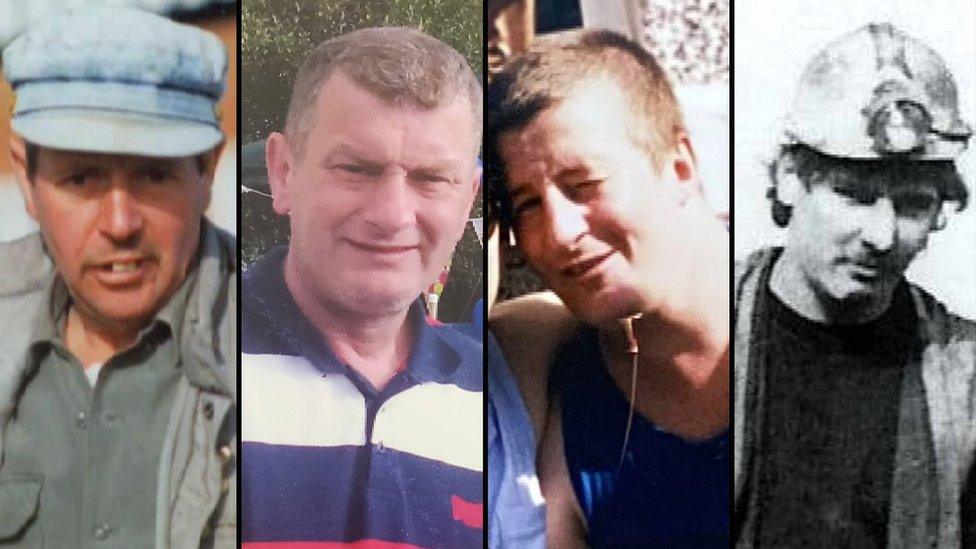
Charles Breslin, David Powell, Philip Hill and Garry Jenkins (l-r) died after water rushed into the Gleision colliery a decade ago
For Alex, his quest for answers is inspired not just by his dad but also by his grandfather Malcolm Jenkins, a former miner who passed away in 2019. still waiting for an explanation for his son's death.
"I know, deep within myself that this is something I want to do for me," he says.
"It's like my sort of family legacy. Me, my father, my grandfather. If this is something I could take on my shoulders and push forward on my own, then it's something I will do."
Trapped Underground: The Gleision Mine Disaster is on BBC One Wales at 20:00 BST on Wednesday 15 September and available afterwards on iPlayer.
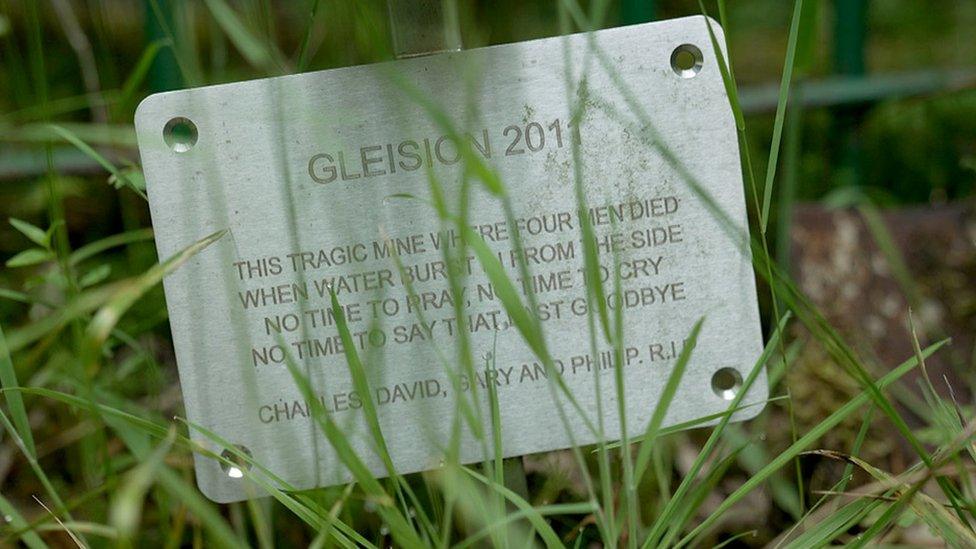

A KILLING IN TIGER BAY: Watch the full and shocking true story
TRAPPED UNDERGROUND: Gleision Mine Disaster- 10 years on

Related topics
- Published19 June 2014
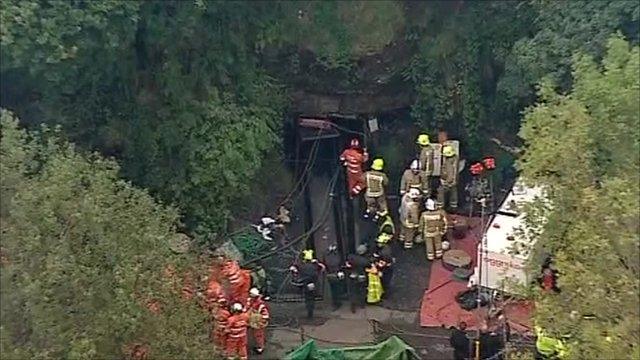
- Published19 September 2011
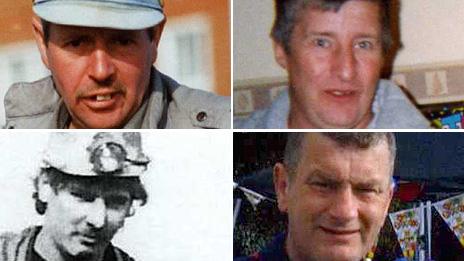
- Published17 September 2012
